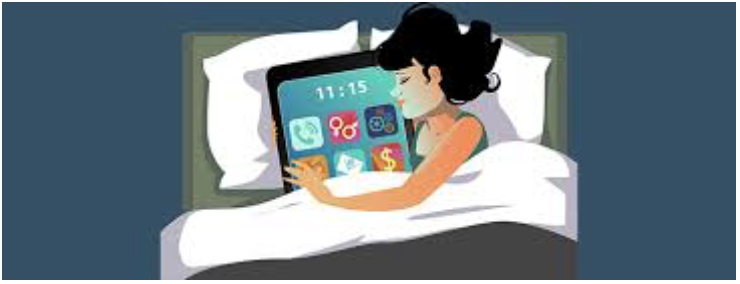Smart Phones: THEY ARE PROBABLY RUINING YOUR SLEEP
November 7, 2019
“I have always felt the need to use my phone, I like the feeling that I get when I start to catch up on my shows after a long day at school. It really helps me relax, but I’ll admit, sometimes it does distract me from other things such as my homework” says seventh-grader Taara Bholananuth.
Taara Bholananuth, who attends the middle school I.S.125q, has had a phone since the year 2011 when she was only 4 years old. She constantly uses it every day; before school, after school, and even during school, if she gets the chance.
As the hours go by, she is continuously checking her notifications, scrolling through Instagram, and searching for new things to watch on Netflix.
“My sleep schedule is awful now compared to back then when I was phone-less..I feel more motivated to use my phone at night because I feel accomplished when I finally finish all my homework and now have the freedom to play whatever games that I’ve downloaded on my phone, plus I have nothing else to do.” After a day’s work of homework, classwork and sitting down listening to teachers lecture, who wouldn’t want to lay down after dark and catch up on their favorite shows or play their favorite games?
“I don’t want to say that I’m obsessed but if you saw the amount of time I spend on my phone weekly, you would probably think that I’m addicted and I honestly probably am but that’s okay,” she states.
But is it really okay?
As more and more teenagers use their smartphones around the clock, this addiction can become more dangerous than they think. So dangerous that they could even be harmful to your health. But how are they affecting teenagers and why?
The accessibility of smartphones
As the years pass by, and technology becomes more advanced than it has ever been before. These easily portable devices are becoming more of a necessity to human beings than even food itself. When using smartphones, many everyday things such as making a grocery list can be accessed in a click of a button. This is one of the main reasons why they are used so frequently worldwide.
Brandon Peters, a board-certified neurologist, and sleep medicine specialist, states, “These marvels of technology function as pocket-sized computers With them, we can perform many activities necessary for modern living. It is possible to make phone calls, send text messages, map a route, surf the Internet, respond to emails, and interact via social media like Facebook and Twitter.”
The size and usability of these phones are what really made them so popular in the first place. With them, people have the ability to stay connected with others instead of traveling long distances in order to contact someone.
The size of smartphones in the modern world is very convenient. They are taken everywhere, including the bathroom, school, and stores. And yes, they are even taken to the bedroom when it is time to go to sleep.
According to Sleep.org, they state, “The problem starts with the fact that 71 percent of people sleep either holding their smartphone, having it in bed with them , or having it on their nightstand.”
As more and more people carry their phones with them everywhere they even begin to sleep with the devices. As studies have shown, sleeping with these devices could be very harmful to your sleep quantity as well as quality. But how many people genuinely do sleep with their phones?
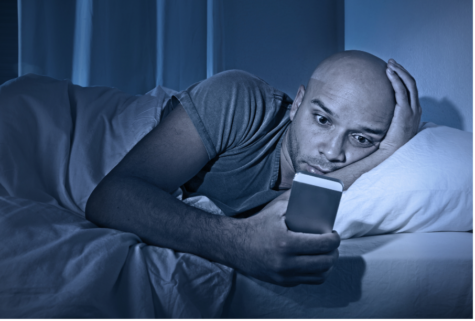
Do you sleep with your phone?
Yes, the fact that these little devices are so easy to use is a huge factor in why teenagers use their phones in the first place. However, the problem really starts with the high percentage of teenagers who begin to truly sleep with these little devices.
According to the article, “Is your smartphone ruining your sleep?”, “The problem starts with the fact that 71 percent of people sleep either holding their smartphone, having it in bed with them, or having it on their nightstand.”
As the percentage rate of teenagers who sleep with their phones begins to increase, this habit can become stronger than you think. After all, this custom can lead to serious health issues.
When people say that others are obsessed with their phones, they don’t necessarily mean that they can’t live without their phones. “A 2016 study of 700 college students separated participants from their phones. They felt so anxious about being apart from their phone, that both their smartphone usage and nighttime awakenings increased. This kind of separation anxiety results in using your phone right up to the moment you fall asleep, further delaying melatonin production and letting cortisol reign.” states the “How does technology affect sleep?”
Cortisol is a steroid hormone that regulates many different parts of the body. “Cortisol can help control blood sugar levels, regulate metabolism, help reduce inflammation, and assist with memory formulation.” It also helps the body respond to stress. Too much cortisol can affect your body in many different ways, one of the main ways is not allowing your body to react to stress properly.
Notifications
“I get around 100 notifications per day…” says ninth-grader, Muhsina Ahmed. “I mostly get notifications from Snapchat, iMessage, Instagram, and probably even updates from my televising apps like Netflix or Hulu.”
Notifications. Whether they are bright lights blinking at you or noise and vibration that your phone produces, these types of actions that your phone makes tempt you to check the hundreds of text messages and notifications that you get a day.

Taara Bholanuth begins her day by getting up and instantly grabbing her phone off her bed. She wakes up at 6:30 with around 20 notifications already, from Snapchat and Instagram, most likely from her classmates. She starts off her morning by checking all of her notifications and re-checking the ones from last night in order to make sure she didn’t miss anyone’s message.
“I’ve been sleeping for 8 hours, maybe one my friends might’ve died or might’ve gotten into a huge fight with someone; I like to start off my morning by seeing what I’ve been missing all night,” she says.
An anonymous source said, “…I would say that since my parents started taking my phone at night is an advantage to my health because I know that I would be staying up all night watching my Netflix shows and reading webtoons until 3 in the morning.” This goes with many students at the iSchool as well.
As you get more notifications throughout the night it makes it harder to “avoid prolonged use when you should be transitioning to sleep.” Other than getting the notifications themselves, the fact that these messages can cause certain reactions depending on the message you get.”…If you read something upsetting, it may be difficult to fall back asleep,” states Dr. Peters.
“Whenever I see something scary on my phone, I can never sleep. Or if something I saw on my phone made me happy sad or one of the major emotions, I stay up for a long time thinking about it. It’s not even just my phone that makes me want to stay up but the things I see on my phone as well,” says freshman Isham Miji.
All the socializing that we do in our daily lives can lead to millions of reactions depending on the facts, news, or even gossip that you’re hearing or being told about. These conversations can become emotional or excite people depending on the topic. Even the thought of plans for the next day that have been made the night before can excite someone and keep them awake.
An anonymous iSchool freshman said, “If my sister never told my parents that I was staying up to use my phone to read, I wouldn’t be getting the amount of sleep I get now.” Many students sleep with their phones right next to them or even leave their phones to charge at an arm’s reach from their bed. This can lead to waking up from texts more often and automatically feeling the urge to check it first thing in the morning.
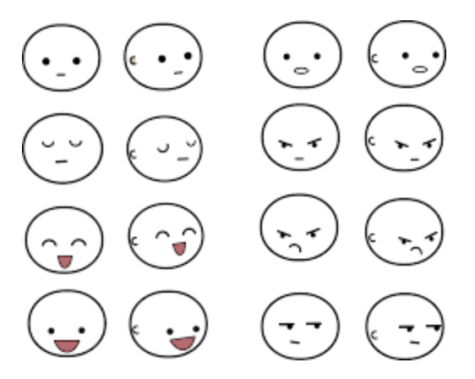
However, the apps that the notifications are coming from are as alluring to the user as well as anything else.
Social Media
With almost 3.5 billion users worldwide, it could be said that social media is the greatest social networking system in the world. These two words “social networking” are more than half of the reason why we even use technology in the first place.
Even if many don’t admit it, almost everyone around the world has talked, seen, and of course, used social media in modern society.
Since the year 1997, social media websites have hugely evolved. For example, a contact-based app called Six Degrees was launched in 1997. With about 3.5 million
users, this social networking app is nothing compared to the new and improved recent versions today.
Social media apps such as Snapchat, Instagram, Youtube, Tik Tok, Facebook, Twitter, and Pinterest have an average of 3.48 billion users.
Social media is used to promote brands, post pictures, and videos, market companies, or even just to watch funny memes that entertain us. Not only do the younger generations use it, but the older generations do as well.
“Social media is a huge platform that entices telephone users,” states Carolyn De Lorenzo. As we grow and as technology becomes more advanced, the use of social media will grow even more than it already has over the past few years.
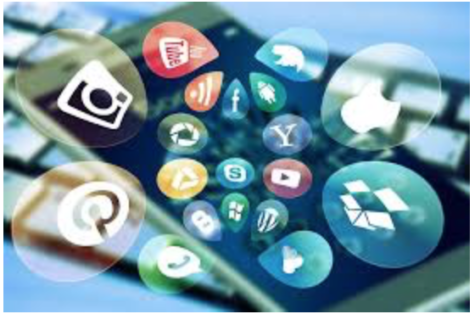
Nevertheless, can the screen on the outside of your phone attract you enough to use your phone as well?
Blue Light
“The bright light actually hurts when I start to use my phone at night. It starts to strain my eyes but I still want to use my phone ‘cause I want to text my best friends goodnight. I also use night mode and dark mode so my eyes can adjust to the light in the darkness,” says an anonymous junior.
Bright light can strain eyes, especially in a darker environment. Everyone has experienced light sensitivity, some more than others, and that’s never going to change. The bright light can probably cause some temporary discomfort. But bright blue lights straining your eyes isn’t even the true reason why it is so dangerous.
“Studies show that direct exposure to blue light can damage your retinas. The American Macular Degeneration Foundation warns that retinal damage caused by blue light could lead to macular degeneration, a condition that causes the loss of central vision,” says Partha Nandi.
The blue light emitted by screens “sends signals to your brain that interfere with the production of melatonin, a hormone needed for sleep,” says Cathy Johnson. Blue light can affect your sleep cycle especially teenagers with developing minds.
It seems like everyone knows that blue light from screens can affect sleep.
However, people don’t realize the other risks they’re taking when picking up their phone from their side tables at 3 in the morning to “check the time.” This ongoing issue of whether blue light affects you or not has been talked about for so long. Many only know of the reduced rates of melatonin, but no one is discussing the other side effects related to this problem.
Why is this important to the iSchool?
Based on a survey sent out to the entire iSchool community these were the results.
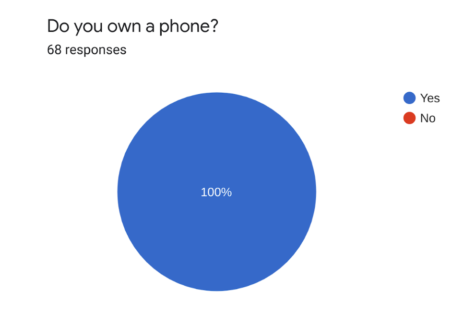
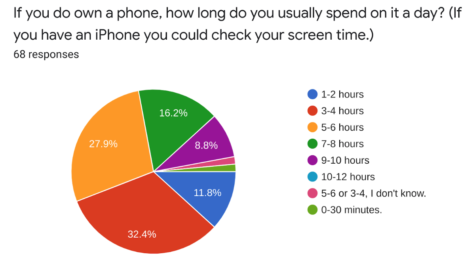
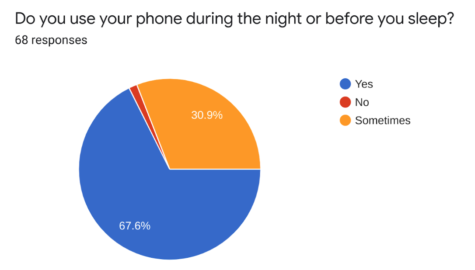
This data taken from the google forms survey “Phones: Are they affecting our sleep?” shows that more iSchool students are prone to less quality sleep than the 1.5 percent of students who don’t use their phones at night.
It also shows how there was a pretty high percentage of students who have phones and indeed use their phones during the night. However, there are more than four hundred students at the iSchool meaning that if only 68 people responded to this survey there could be a higher percentage of students who use their phones at night as well.
Whether or not you use your phone for a long time after dark there are always going to be consequences. However, many smart-phone companies are actually adding features to your phone in order to reduce the amount of damage that their phone could have been possibly doing to you.
Smartphone companies are trying to help
Smartphone companies such as Apple and Samsung have created a new setting on their phones that help smartphone owners adjust their screens to a warmer setting, which is way more safer for users who are more sensitive to certain blue lights.
Not only have smartphone companies created ways to help with blue lights, but they have also added new things to help with “phone obsession.” On iPhones, things like downtime and app limits let set daily limits for certain app categories.
For example, if you feel like a certain social media site is distracting you from your schoolwork but you need Safari to use Google docs in order to type an essay, you could use set app limits for that category of apps on your phone and leave Safari unblocked in order to use it. You could get your work done with the app limit on the app that is distracting you. No notifications and no access to that app until you finish the work.
The app limits are very customizable depending on what you need to access and what you shouldn’t. When you schedule downtime in settings, you can choose a time where downtime automatically enable and “only phone calls and apps that you choose to be accessible are available.” Other than that, everything is un-accessible until your downtime is finished, which you can also customize.
However, these types of limits might not help everyone. There are many good substitutions that you can do instead of using your phone before you sleep.
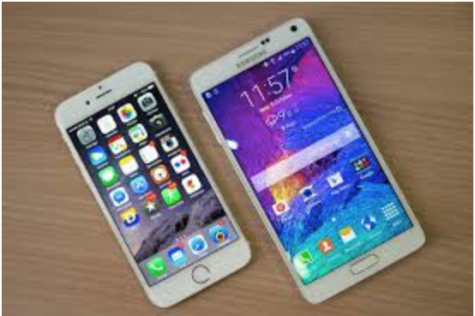
“One good substitution is reading. Reading an old-fashioned, printed nook under lamplight (as opposed to bright overhead lighting is a great choice.) And using an e-ink e-reader (like the Kindle Paperwhite, as opposed to the Kindle Fire) is also a good idea because it doesn’t produce the same type of blue light that a smartphone or tablet would,” according to the National Sleep Foundation.
However, not everyone loves to read. There are other ways to enjoy your night without having to stare at a screen, including spending time with family to playing with your pets. These might seem like ordinary things to do at night, but it’ll make time pass by and even make you feel even more tired and tempted to sleep. You shouldn’t feel the need to be on your phone until 3 o’clock in the morning.
Taara Bholananuth has gone through a journey when trying to figure out whether to fix her habit of using her phone until late at night. After being interviewed, she has recently been trying to fix her routine because of the effects she has found that could be very harmful to her.
She has recently stated, “I started tracking the amount of time I spend using my phone and my other electronic devices, which resulted in 7 hours on average per day, and I knew I had to do something about it. Since being interviewed I’ve been hanging out with my friends, who have seemed to realize that I’ve stopped checking my phone so often. I started to see that I didn’t wake up so tired every day and even though I miss using my phone, I like feeling fresh and energized in the morning.”
As technology starts to become more advanced throughout younger generations, it’ll keep affecting teenagers around the world.
Even though there are many ways to limit the amount of damage done to your sleep and your body in general, you might not find these ways as successful as they are said to be, or there might be something out there that will help with the obsession with the technological world these days. Scientists and researchers will keep researching about this topic in order to find new discoveries as the affected get worse over time.
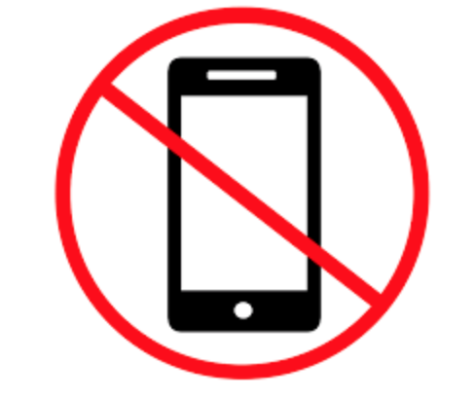
As for right now, teenagers should have an idea of how much they are using their phones and how it could affect them long term. After all, there is something out there for everyone – the choice all depends on you.
